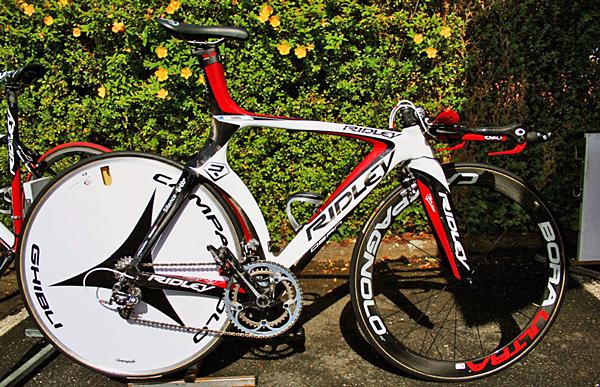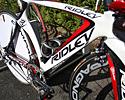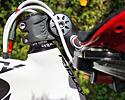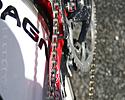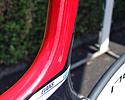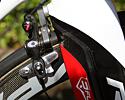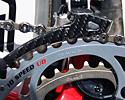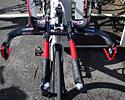
 |
 |
 |
 |
 |
 |
 |
 |
 |
 |
Pro bikes, July 9, 2008
Cadel Evans' Silence-Lotto Ridley Dean
Ridley's aerodynamic advantageBy Ben Atkins in Brest, France Cadel Evans reinforced his status as an overall favourite in this year's Tour with an emphatic performance in the first individual time trial. Evans' 36'12 time (and blistering 48.9 km/h average speed) was good enough for third place in the stage, earned him valuable time over a number of key rivals and even bested the time of current world time trial champion Fabian Cancellara (CSC-Saxo Bank). Evans' good form undoubtedly deserved most of the credit for the day but his new Ridley Dean time trial frame likely netted him a few extra seconds as he streaked around Cholet. Ridley designed the organic looking frame - that ticks all the "looks fast standing still" boxes -using the usual wind tunnel tools but also with oil flow mapping in conjunction with Formula 1 engineers. In addition, Ridley has licensed Jetstream technology from Oval Concepts - which it has named R-Flow - and made the fork blades and seat stays from two airfoils to further cut down on drag around both wheels. This R-Flow technology, says Ridley, actually creates a vacuum around the spokes reducing turbulence and drag by up to 7.5 percent. In addition to the smooth lines of the frame and the rear disc enclosed inside the seat tube, Ridley has made some changes to the surface itself. Conventional wisdom says that a smooth finish is best for aerodynamics but, according to Ridley, its so-called R-Finish is even better at the relatively slow speeds encountered on a bicycle. A deliberately rough strip along the sides of the frame's leading edges creates a turbulent boundary layer which allows the rest of the air to flow over it more smoothly, a similar effect to the dimples used on many of Zipp's wheelsets. Ridley claims that this reduces drag by as much as 4 percent. Ridley has also added a number of touches to ensure that the complete bike, not just the frame, slices through the air as smoothly as possible. Both brakes have been moved out of harm's way, placing the front one behind the fork crown and the rear behind and below the bottom bracket. The callipers - like a great deal of Silence-Lotto's finishing kit - are specifically aerodynamic items from Oval Concepts. In all, the Dean has a claimed 17 percent average aerodynamic advantage over the leading competition (whatever that may be). More importantly, this new frame is far more aerodynamic than its Cronus predecessor (which Evans didn't even use last year). Ridley's calculations estimate that Evans would have saved almost a minute on the 117.5km of time trialling in last year's Tour. Given that he finished in Paris just 23 seconds behind eventual winner Alberto Contador (Astana), it doesn't take a mathematical genius to calculate that if Ridley's claims are true he would have won the Tour. Like most of the road going bikes from Ridley, the Dean features an integrated seatpost with an external clamp. Evans' Selle San Marco saddle features a more heavily padded nose than most standard road saddles due to the expected higher amount of time spent on the front end in the aero tuck position. Evans' Oval Concepts cockpit setup includes an A901 Laminar Upgrade bar clamped in an A710 Adjustable RBT stem. That stem has been lowered as much as the beak-nosed head tube will provide, thus allowing the Australian to get his back as flat as possible. The Ferrari-red Oval A900 straight-bend extensions also make for Evans' preferred low forearm position and the forearm pads have even been trimmed away for a narrower tuck. Similarly red finished carbon A900 brake levers are integrated into the bar's outer grips to minimise the frontal area of the whole setup. As is often the case with Aussie riders, the front brake is connected to the right lever and the rear to the left. The rest of Evans' Dean - with the exception of those brakes and levers - is fitted with a Campagnolo groupset although interestingly, not one of the newest 11-speed versions. The chainset is a standard 10-speed Record Ultra-Torque fitted with a pair of faster moving 54- and 42-tooth chainrings (he may even have switched for even bigger ones come the day of the time trial due to the tailwind finish). Even more interesting, though, is the 11-21T cassette fitted out back as it only has nine sprockets. The Campagnolo Ghibli disc that Evans uses actually uses a shorter-than-normal freehub body so the Italian company makes a special 9-speed version (with 10-speed spacing) just for this wheel. Moving the C10 chain between these rings and sprockets is Campagnolo's iconic bar-end shifters. Both front and rear derailleurs are also Campagnolo Record. The front is a braze-on version attached to an aluminium bracket, riveted to the side of the aero seat tube. The rear is attached to a replaceable aluminium hanger below the horizontal track style dropouts. The dropouts themselves have adjustment screws to move the wheel fore and aft in order to comply with UCI regulations which govern how close the tyre can get to the seat tube. As Campagnolo supplies Silence-Lotto with wheels as well as groupsets, the Ghibli disc is accompanied by a deep section carbon Bora Ultra on the front. Both of these wheels are wrapped in almost entirely slick Vredestein Fortezza Pro 21mm tubular tyres. The bike was finished off with a single Tacx Tao bottle cage in silver carbon but Evans ran without for Tuesday's short 29.5km test. At a total weight of 7.95kg, Cadel Evans' Dean is hardly likely to worry the race's commissaires (despite not being run under the UCI, this year's Tour will still enforce the 6.8kg minimum limit), but for a time trial bike it is still very competitive. Against the clock, cutting through the air is a far greater priority than cheating gravity and if Ridley's aerodynamic claims come to fruition the Australian should have every chance to realise the dream of being the first man from the southern hemisphere to win the Tour de France. PhotographyFor a thumbnail gallery of these images, click here Images by Ben Atkins/Cyclingnews.com
| |||||
Full specificationFrame: Ridley Dean Critical measurements Brakes: Oval A700 |
Front wheel: Campagnolo Bora Ultra Bars: Oval A901 Carbon Laminar Upgrade Aero bar with A900 straight
extensions, 42cm (c-c) Pedals: Look KeO Carbon Ti Total bike weight: 7.95kg (17.53lb) | ||||
